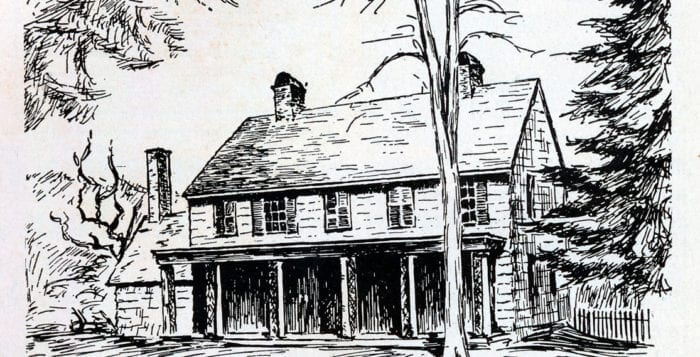
By Beverly Tyler
First in a two-part series.
May 1, 1790, Selah Strong of Setauket shared his Patriot views with Robert Heaton of London.
“Almost every one is partial in favour of their own government, and perhaps you will charge me with being prejudiced in favour of ours, but it is my opinion, that this government is much better calculated for the enjoyment of our Civil Rights, than the Constitution of Great Britain.”
Strong was born Dec. 25, 1737, in a house built by his father Thomas at Mount Misery, now Belle Terre, Long Island. His mother Susannah was the daughter of Samuel Thompson, a family connection that extended from the community of Setauket to the Town of Brookhaven where Jonathan Thompson and his sons Samuel and Isaac, and Selah Strong served as town trustees before and after the Revolutionary War. Strong was elected a trustee of the Town of Brookhaven each year from 1767 to 1777, and as a representative to the first Provincial Congress of New York in 1775.
Samuel and Susannah Thompson’s son Jonathan and his son Dr. Samuel Thompson served in Long Island militia companies in 1775, and most likely as captains in the Continental Army in Connecticut during the Revolutionary War, as they were refugees to Connecticut following the British occupation of Long Island in August 1776. Strong was a captain in Colonel Josiah Smith’s regiment in 1775 and Captain of the Brookhaven minutemen in 1776. A refugee as well, Strong also most likely served as a captain in the Continental Army in Connecticut.
Jonathan Thompson was married to Mary Woodhull, Revolutionary war spy Abraham Woodhull’s aunt. To add more intrigue to the extended family lines, Jonathan Thompson’s second son Isaac, who lived in what is now Sagtikos Manor in Bay Shore, remained on Long Island during the war and is believed to have been a spy for the Culper Spy Ring in Setauket. President George Washington spent the second night of his Long Island trip in 1790, at “the home of Squire Thompson,” to thank the spies who had provided much needed intelligence during the war.
In 1760, Strong married Anna Smith, great-granddaughter of the Lord of the Manor William “Tangier” Smith. The Smith homestead was on Little Neck, now Strong’s Neck, in Setauket. After the British took control of Long Island in 1776, many Long Island patriots became refugees in Connecticut. The couple remained on Long Island with their five children, probably at Strong’s family home at Mount Misery. Strong was still a town trustee. However, in the election of 1777 he and Jonathan Thompson were replaced by more Loyalist-leaning Brookhaven Town residents.
In January of 1778, Strong was arrested and imprisoned in a sugarhouse prison in Manhattan “for surreptitious correspondence with the enemy.” Strong’s position as a Patriot captain and outspoken town leader probably made it easy for someone, possibly a Loyalist Brookhaven town trustee, to suggest that Strong might be a person of interest to the British authorities. At some point his wife Anna, known to her family and friends as “Nancy,” obtained his release by appealing to her Loyalist relative in Manhattan. Strong did not then return to his home on Long Island but became a refugee in Connecticut and probably a great help to the soon to be developed Culper Spy Ring in Setauket.
It is easy to connect Strong with the Culper Spy Ring as one of the known spies was Nathaniel Ruggles. Ruggles was placed as a spy at Old Man’s (Mt. Sinai) by Benjamin Tallmadge, General Washington’s chief of intelligence.
Long Island Historian Kate Wheeler Strong, great-great-granddaughter of Anna Smith Strong, wrote the following article in her 1941 “True Tales,” published by the Long Island Forum. “It is evident that my great-great-grandfather (Selah Strong) must have helped Nathaniel Ruggles, one of Washington’s Spies. This is shown by an abstract from a will of Ruggles dated 1793, left in my great-great-grandfather’s keeping. In appointing him one of his executors Ruggles wrote: ‘I appoint my worthy patron Selah Strong Esq. Late judge of the COUNTY of Suffolk who hath snatched me from the jaws of my adversaries and befriended me in every difficulty as far as was consistant with his duty as an honest man.’”
Beverly Tyler is Three Village Historical Society historian and author of books available from the society at 93 North Country Road, Setauket. For more information, call 631-751-3730 or visit www.tvhs.org.






